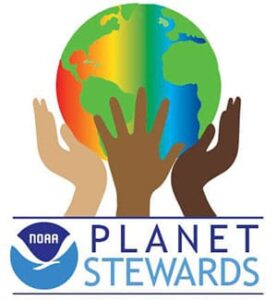The Charleston Planet Stewards project, created by staff from the NCCOS Laboratory in Charleston, South Carolina, connects local educators and students directly with NCCOS scientists and research. Participants learn environmental data collection techniques, practice science communication, and engage in stewardship of their coastal communities. The project has the added benefit of supporting the NOAA-wide Planet Stewards initiative.

NOAA Planet Stewards provides funding and resources to educators to carry out hands-on stewardship projects that conserve, restore, and protect communities and natural resources. Educators working with elementary through college-aged students are provided access to opportunities and resources, enabling them to build scientifically literate individuals and communities prepared to respond to environmental challenges monitored by NOAA.
With the support of NOAA Planet Stewards, NCCOS’s Charleston Planet Stewards gives K–12 educators in the Charleston, South Carolina, region the knowledge and resources to help their students create stewardship projects that mitigate the impacts of climate change in their communities. Educators assess their students’ understanding of science and their role in their environment to identify how environmental project-based learning experiences may influence their students’ science literacy and personal motivation.
This past fall, Charleston Planet Stewards staff gave an overview of a project at the Atlantic Estuarine Research Society/Southeast Estuarine Research Society Fall Meeting, the Southeastern Environmental Education Alliance/Environmental Education Association of South Carolina annual conference, and organized a virtual training in harmful cyanobacteria identification for students of St. John’s High School in Charleston, South Carolina (see photo). Scientists from NCCOS’s Phytoplankton Monitoring Network conducted the training for students who are studying the ecology and water quality of stormwater retention ponds.
By engaging educators and their students in hands-on projects, Charleston Planet Stewards helps build communities that can more readily respond to environmental challenges along the coast, such as sea level rise and marine debris.

